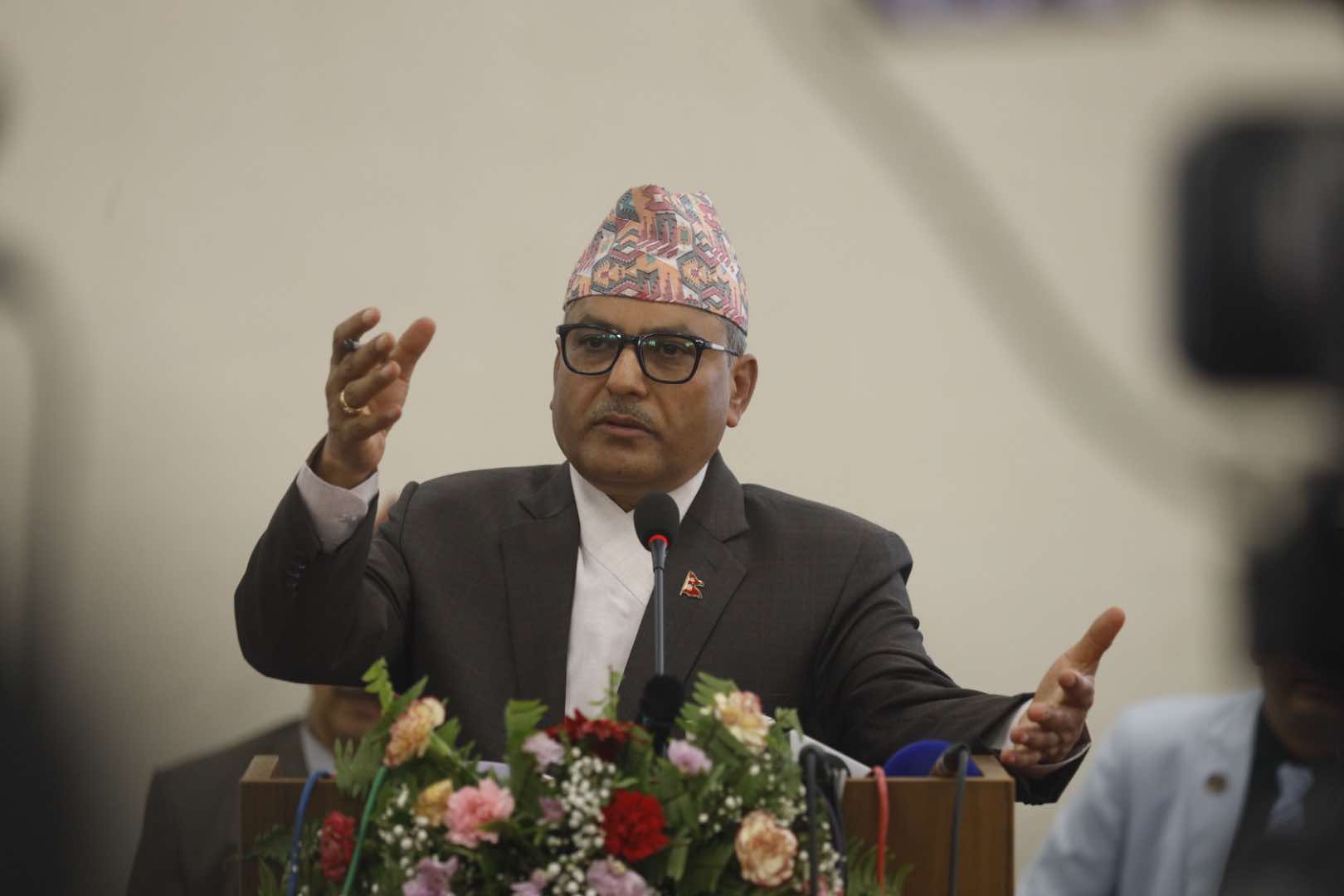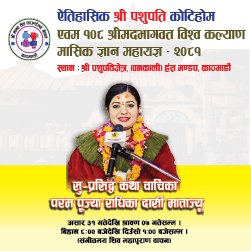An unconquered seeker of music
We use Google Cloud Translation Services. Google requires we provide the following disclaimer relating to use of this service:
This service may contain translations powered by Google. Google disclaims all warranties related to the translations, expressed or implied, including any warranties of accuracy, reliability, and any implied warranties of merchantability, fitness for a particular purpose, and noninfringement.


Melodies from real instruments are more ear-pleasing, more heart-touching than the melody of music played by a synthesizer. And, before the creation of instruments, the human voice has been classified by music gurus as an acoustic instrument, which reaches the ear from a natural source through the medium of wind.



When Bhaktaraj Acharya's voice rang out from Radio Nepal in the early 2030s, it clearly reiterated the same well-established fact that, like a flute, the voice is also acoustic.
It was no surprise when Bhaktaraj Acharya entered radio as a new singer among singers with different tonal qualities like Bachukailash, Narayangopal, Manikaratna, Premadhwaj, Fatteman and Deep Shrestha. The surprise was that from the very first song, Bhaktaraj Acharya's position became clear, memorable and understandable - among the audience. And, whoever sings the song, but when he conveys the feeling in the song with his voice, the audience accepts it and makes the vision in the song believable, that is the identity of a good singer. His singing was instantly accepted by the audience of that time. In singing, his craft of clarity in pronunciation and universal acceptance of singing must have played a significant role in this. Thus the Nepali listeners got another wonderful singer, a new gem added to Nepali modern music.
didn't have an auto-tuner back then like it does now, which would match even mismatched tunes. Therefore, to become a singer in that era, of course, one needed the knowledge of rhythm and the ability to control the heart of the audience. Where was that enough? It is said that time is money. However, it required patience and courage to spend a lot of time and money at that time. At least one Kanth-Shilpi had to spend two to four months continuously to record a song, that too every day. Along with daily living, practicing music and creating songs was no less difficult. After the song was ready, the only recording arrangement was Radio Nepal in Singha Darbar. Somehow, even if the song became popular, no one could have imagined that the song would earn enough money. Songwriters, musicians and singers used to get ten rupees each. Therefore, Bhaktaraj's journey as a singer could not have lasted long, if he did not have the ability to compose music by himself along with singing. He did not even sing in the music of the musicians of that time in the early period of
singing. However, his singing appetite was not satisfied. If one wants to analyze his lyrical journey in contemporary times, it will be difficult. It was a long and tiring process of requesting songs from songwriters, attending music satsangs with musicians and recording songs after getting approval for the dates to sing Ballabal at Radio Nepal. But, when he started to prepare music for his own songs, when his songs started to be engraved in the hearts of listeners immediately after recording, probably then along with singing, the musician in him also emerged and his journey of singing songs in his own music must have started from there.
During his singing career, he never sang or had the opportunity to sing half a dozen songs in other people's music. I only remember singing one song each in the music of Amber Gurung, Madan Periyar, Norbu Chhiring and Prakash Gurung. What is meaningful and remarkable is that no matter how many of his songs were recorded, some of them left the hearts of the listeners. His subtle understanding of how to express the words in a song in a melody played a role in this. Arrangement, addition of instruments, interlude and prelude beautify the song. But all embellishments paled in comparison to his singing. His recorded songs are a record of that.
music should give a shape to the song. Every serious musician pays close attention to this when composing a song. Different composers have different original ways of shaping a song. There is no need to argue about who is good and who is bad. Because there is no comparison in art, each art complements another art.
And Bhaktaraj Acharya also had his own unique way of making music. His style of creating melody by pronouncing each word according to the meaning of the word has created a unique identity in Nepali modern music. Just as the works of Diwangatdwaya Natikaji and Gopal Yonjan have created a distinct and unique identity in Nepali modern music, Bhaktaraj has a unique and rare place. It may be the result of serious sadhana that he realized or it may be a precious gem that he was born with. My affinity with songs and music was from my childhood. At the same time, I was introduced to my brother Bhaktaraj, but through his songs, as most Nepalis who have not met him in person must have been introduced to him.
Now let's talk about adolescence – the romantic chemistry in my mind was mostly nourished by the songs of Dai Bachukailash and Narayangopal. At that age my eyes fell on someone. I was infatuated with her. Fittu in the intoxication of love or attraction! But I had nothing to impress him. Suddenly an idea flashed in my mind. I went to the room. I flipped over the copy and memorized a song from Dai Bhaktaraj's songs on the page - 'Timi hasideu Ekchin, filled with the sweetness of love, you are now ashamed of the meaning of love.' That song gave voice to my feelings at that time. After writing the
song, I tore the page and wiping the sweat, controlling my fast beating heart and hiding the eyes of the world, gave it to the angel I wanted to please. I don't know why this song came to my mind after forgetting all the other songs I heard. It was not enough to give the song, I went to his house and told him the same song in the silence of the night. At that time, when someone came and sang near the house, it was not considered noisy, it was considered entertaining in the fossa. Such tole singers were found in every village. While some people were fast asleep while the singers were performing their talents, the rest of the people who did not sleep listened to the music. My love blossomed or withered after that. Now I want to say, after that one of my favorite singers became - Bhaktaraj Acharya. Like every singer, I eagerly waited for his new songs. I used to go to Radio Nepal from time to time with my friends Diamond Singh, Omvikram Bista, Santosh Basnet etc. Dai Bhaktaraj was also seen. And, the talk was only formal, short-lived and focused on music. The
days were passing. The world is in fun, everyone got what they deserve, I was the only one struggling, I thought. There was no idea of democracy, democracy and republic in Nepal at that time. And, at that time singer-composer Deep Shrestha, lyricist Sripurush Dhakal and I used to stay together often. Suddenly I had to hear something unexpected - at Bhaktaraj Acharya Hospital. All three of us went to the hospital. Someone has brutally beaten him. Probably his treatment was not done in time and properly. It is said, and some even believe, that destiny is powerful and everything is written. But, why was the destiny of such eccentric and worshiping music artist decided like that? Why does suffering continue to fall in the destiny of people including artists? The answer is not only me, but no one should have got it.
Everyone has to fight their own battles. This truth is very cruel. He also fought the battle of Dai Bhaktaraj himself. Only a few close people were with him. A few years later, it was discovered that his tongue was cancerous and the only option was to amputate it. It was such a hurtful thing that one lacks words to express it. One of my closest doctors was – Anil Khanal, Doctor of Homeopathy. Believe it or not, this medical system is very amazing, it cures various diseases quickly. Anil fell in love with the country's rare singer and his work. He prepared very expensive medicine for Bhaktaraj. He had no plans to campaign. His intention was to give the medicine to him free of charge and make him free from the disease. He asked me to accompany him to Bhaktaraj's house. As soon as we heard, we both reached his residence, considering that work as the most important thing.
There were people all over the house. It was natural for Bhaktaraj to be in a completely disturbed mood. No one in the family was in a position to listen patiently to Anil when the mountains of pain fell. How cruel fate? Anil was disappointed and we both went to Lagankhel. And we returned home by bus. Later news came, his tongue was cut off in Delhi. Flyers were being dropped from a helicopter to promote Michael Jackson's concert that evening. One country's son's tongue was being cut, another country's artists were having a concert. Don't know who destiny is and why it plays the tearful game with people?
I started working in 'Himal Khabar' newspaper while finding a way to earn a living. There was also a boutique auditorium called Baggikhana. Sometimes musical, poetical, cinema related and meaningful debate programs were held there. Kanakmani Dixit, Basant Thapa and Dr. In the meeting between Noblekishore Rai, there was a discussion one day whether any effort can be made to turn Bhaktaraj's tongue. Dr. Noble was Nepal's ambassador to Germany at that time. He had to arrange and pay for the surgery in a German hospital somehow. The national flag carrier will bear the air expenses. Travel expenses were also needed, for that it was decided to hold a musical program at Baggikhana. Without hesitation, the price of the ticket was set at 1000, which was expensive for that time. I was selected to coordinate the
musical program. Ishwar Amatya and Lochan Bhattarai were selected as singers. Instrumentalists sought. Rehearsed. And, the program ended with grandeur. Some of the raised money was given to artists as a token of love and the rest was transferred to the sister-in-law. They flew to Germany. Brother's shelter in Germany. It was fixed at Noble's residence. And, we were anxiously waiting for the results. The German doctor understood the importance of the singer and also the importance of the occasion. With all emphasis they completed their work. And, all of us started waiting for the day of good news, being happy that we had done a good deed.
We all had pure intentions, but even if people's intentions are pure, our intentions will not be accepted by destiny. Although everything was done well, the doctors did not succeed in restoring Bhaktaraj's singing. The brother-in-law did not know in what mood he returned to the country. Because it was not a sightseeing tour. You may have come back with a pang of disappointment. I don't know what they thought and how they took the failure of that effort, in good faith, to those who had stuck their necks out and taken the lead in returning Bhaktaraja's voice. I worked for him as an ordinary soldier. Maybe I took the doctor's failure on my own? So after that I could not go to my brother's house again. Even now, when I am playing with things in private, sometimes the picture of my brother's life plays in my mind. His life seems to me no less than the tragedy of a Greco-Roman drama. Which is considered a greater tragedy between the writer having Alzheimer's and the singer not having a tongue? I don't know, I have no answer.
Bhaktaraj may have given only 4/500 songs to the Nepali audience. A hundred meaningful songs are no more valuable than a thousand meaningless ones. He rarely sang poetry-less songs like now. His songs were accompanied by poetry. Poetry becomes more poignant when accompanied by music. So future generations will hum Bhaktaraj's songs with the same love as our generation hummed. Not only that, if his songs are practiced literally, those same songs will be Riyaaz for students of singing. Moreover, his two children Satya and Swaroop are no less assets to our society and music field than his musical works. Both have carried forward their father's legacy with great integrity and skill.
Bhaktaraj, who gives a clear voice to the love, feelings and personal feelings that Kayan could not express, will continue to shine in the sky of Nepali modern music. And the life philosophy, human sensibilities and poetry in Bhaktaraj's songs will make his works timeless.
 प्रकाशित : फाल्गुन १९, २०८० १२:२१
प्रकाशित : फाल्गुन १९, २०८० १२:२१

 २६.१२°C काठमाडौं
२६.१२°C काठमाडौं
















